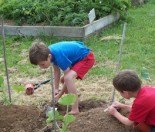My family is pretty typical of a lot of modern families these days in that there are never enough hours in the day to spend time with each other. Find out how we created wellbeing in our family with a family play day.
Week days are filled with routines including waking, feeding, cleaning, rushing, learning, working, more rushing (including many taxi-duties for parents to afters school activities), more eating, washing before collapsing into bed to recharge in order to repeat it again the next day.
Both the adults in our household work varying hours, which results in there being only one day of the week in which we are all home, in the same house, in the same environment together.
Because of this, my husband and I have made it a priority to have this one precious day our ‘family day’.
Creating Wellbeing with a ‘Family Play Day’
‘Family Play Day’ is a day where as a family we get to make a decision about how we are going to enjoy our time together. This is without the monotony of the weekday routines. This day has a different feel to it, and has, in itself, its own unique routine.
It is more relaxed, and more child-directed than our week day routines. Where during the week, children operate to adult-directed schedules, expectations and requirements; our family day starts off in a far more relaxed manner.
The only two adult-led expectations of the day are that we will sit and eat together (be it lunch or dinner) and that we will have some sort of fun by spending time together in the day. Otherwise, the day itself can be largely decided on by the children in our house.
Obviously some requests need some careful management (particularly involving large quantities of Mum and Dad’s money that simply is non-existent).
In a world where children are facing an ever-increasing pressure to keep up and grow up at a rapid pace, child-directed play is fundamental in building confident, self-assured, problem-solving, risk-takers. Children with these skills will be able to face a rapidly-changing future with flexibility of thinking and resilience. Children who are forever being told what to do and how to do it simply will not.
There is little that gives children greater pleasure than when a grown-up lets himself down to their level, renounces his oppressive superiority and plays with them as an equal. (Sigmund Freud)
So how do parents have ‘fun’ with their kids in a child-directed way? How do adults truly play with their children so that their kids have maximum benefit from the experience?
By saying we will ‘play’ with our kids underestimates not only the benefits to the children, but it also makes it sound so simple. After all, play is easy isn’t it? It’s just a bit of mucking about! And yet, it is quite difficult to do, if you are truly doing it right.
To engage with your children through child-directed play, there are a few don’ts and a lot of dos. A basic rule of thumb though is to start by listening.
Listen to what your child wants to do. Follow their lead. Allow them to be the boss of their game, and you simply are their playmate. Many children who become demanding and attention-seeking as they grow have not had the opportunities to be the boss and be in charge on their own terms.
As a result, they try to impose this in situations that are not appropriate. So by allowing them to be the organiser and boss of the game gives them a bit of control in their day. f a child struggles initially to think of or initiate play by themselves, consider what their interests are and provide them with some gentle prompts in how to get going.
Once they become involved, stand back and give the child the attention they are wanting for their own ideas.
Secondly, try hard to encourage and praise rather than correct, judge or compete with your child.
The most important aspect of play is the ‘doing’ rather than the outcome. It doesn’t always have to make sense to us as adults. It doesn’t always need to be aesthetically pleasing, or correct. The benefits for the child have been in the journey, not the destination.
Praise their efforts and ideas, their trials and thinking, rather than reserving this for the end result. This is where the crucial life-lessons are being trialled, experimented, revised and reviewed by the child.
How often do we observe children spend a lot of time making something only to happily walk away and not look at it again?
Try to avoid competing with your child to build or make something better, or to continually win against them. While it is important that children learn the valuable skill of losing as well as winning, as parents, we are first and foremost our children’s cheerleaders. If we put ourselves in the position of being in opposition or always doing it better, then we will potentially impact on the safety of our relationship with our kids.
Thirdly, observe and comment rather than question.
Children are required to answer far too many questions about what they’re doing, why they’re doing it, what they’re thinking and what they might do next. For them to be enjoying themselves they shouldn’t need to necessarily be thinking about their thinking.
As parents, we need to be enthusiastic supporters of their efforts, and by commenting on what we see rather than what they aren’t doing, or asking for clarification, we are taking the pressure off and allowing them to play at their own pace.
And finally, allow for mess. Children are naturally messy creatures.
If they are truly playing in the moment, they don’t consider the long-term implications on their sock drawer if they are running around outside in puddles with no shoes. Children don’t consider the possibility of what might happen if they aren’t wearing clothes suitable for getting paint on. They simply want to paint.
While, again, it is important for children to have guidance when engaging in messy play, it shouldn’t come at the expense of limiting their experiences completely. Children playing will have fun with mess. And what’s the worst that can happen? We might just have fun too, getting messy alongside our children.
What better way to enjoy family fun in getting down and dirty with our kids!







